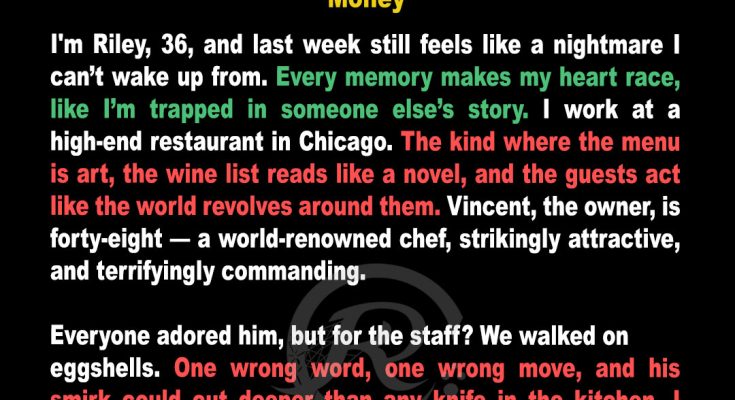I was minutes from clocking out at the restaurant where I serve the city’s most entitled customers when Vincent — the brilliant, terrifying owner — dragged me into his office and fired me. I thought my world had ended. I had no idea what was coming next.
The upmarket restaurant where I work serves the type of customers who honestly believe they’re minor royalty.
Take Table 14 tonight: a disaster wrapped in a bad attitude.
“This pasta is an absolute insult! It’s overcooked, it’s cold, and frankly, I expect better for $50 a plate!”
The man was practically shouting, making every other head in the dining room turn.
The man was practically shouting.
“Sir, I am terribly sorry,” I said, still smiling as I leaned in just a bit. “But to be fair, for $50, that pasta probably had a better education than my car.”
He froze. His face, red with anger moments before, cracked into a surprised, reluctant laugh. His wife smirked.
Crisis averted.
But my moment of quiet triumph quickly evaporated.
My moment of quiet triumph quickly evaporated.
Standing just outside the kitchen’s swinging doors was Vincent, the legendary owner and head chef. Forty-eight, handsome, and terrifying.
He wasn’t smiling. He was just watching me, his dark eyes like chips of ice.
We tiptoed around him like a ticking bomb, and I had accidentally drawn his attention.
That was the moment he turned against me. I just didn’t realize it until a week later.
We tiptoed around him like a ticking bomb, and I had accidentally drawn his attention.
It was a Friday night, and the place was packed, as usual. The kitchen was screaming, and the dining room was buzzing.
I finished my last table, finally clearing the plates and smiling through the exhaustion. I grabbed my bag and was just about to clock out when Vincent came storming into the room.
“Riley!” he barked, his voice cutting through the clatter like a cleaver.
Vincent came storming into the room.
I froze instantly, my heart jumping straight into my throat and racing.
“Office. Now,” he commanded.
I followed him, my stomach sinking with every step. I clutched my bag against me, deeply aware of the contraband tucked inside it.
Did he know what I’d been doing?
Did he know what I’d been doing?
Earlier that evening, I’d cleared a plate with a practically untouched steak and roasted veggies. It was just going to be thrown away, so I packed it into a takeaway container and tucked it into my bag.
I wasn’t taking it for myself — I was taking it home for my son, Eli.
He’s eight, and he has congestive heart failure. His treatments are staggeringly expensive, and the bills pile up faster than I can manage.
The bills pile up faster than I can manage.
Some days, I skip meals so he can eat something better than cereal. That night, I was just trying to make it through until payday. That’s all.
Vincent was already sitting behind his desk, arms crossed over his chest like an armored guard.
He didn’t even look at me as he gestured to my bag. “Open it.”
I slowly complied, removing the container and placing it on the desk.
What he did next shook me.
What he did next shook me.
He dumped the contents of the container right onto the pristine surface of his desk. The steak looked pathetic and accusing under the harsh office light.
“You’re fired. Immediately,” he said, his voice cold as liquid nitrogen. “The rules are clear. Zero tolerance for theft.”
I swallowed hard, trying to keep the tears from spilling over. “Please… it’s for my son. He’s sick. I just wanted him to have a meal. The food was going to be thrown out anyway…”
“You’re fired. Immediately.”
Vincent leaned back in his chair, his eyes narrowing.
“Please don’t fire me,” I begged. “The hospital bills are tremendous, and without this job…”
But the words died in my throat. His face was expressionless.
He didn’t care.
I braced myself for the final, devastating dismissal, but then he did something I never saw coming.
Then he did something I never saw coming.
“Your son?” His voice wasn’t cold anymore. It was suddenly strained, almost breaking on the last word. “Tell me.”
And so I did.
I told him about every sleepless night spent by Eli’s bedside, and every hospital bill I had no earthly idea how to pay.
Then I opened my wallet, pulled out a small, creased photograph of Eli, and handed it to him.
His voice wasn’t cold anymore.
Vincent went absolutely white. His hands trembled as he took the photo.
“I… I know that look,” he whispered, his eyes fixed on Eli’s smiling face.
I blinked, confused. “Look? What look?”
“That’s my son’s look,” he said, the words heavy with a pain I suddenly recognized.
I froze. “Your… son?”
His hands trembled as he took the photo.
He nodded. “Yes. My boy. Years ago… I had a wife, a son. My son got sick. Really sick. I worked day and night, two jobs, whatever it took. I couldn’t save him.”
My heart clenched. He had lived through the moment I feared.
“He was five years old when I buried him. And I blamed myself, Riley, every single day since then. And I became… like this.” He gestured vaguely to himself. “Bitter. Angry. Hard.”
My heart clenched.
Suddenly, everything clicked into place.
The cruelty, the sarcasm, the unrelenting cold perfectionism — it wasn’t senseless malice. It was pain and guilt that he had turned into an impenetrable suit of armor.
What an awful way to live, I thought, a strange mixture of pity and sorrow washing over me.
I whispered, “I… I’m so sorry.” What else could I possibly say?
Suddenly, everything clicked into place.
He shook his head, looking down at the photo of Eli, then back up at me. “Don’t. You… you reminded me of him. That relentless, simple joy in the face of everything awful.”
I didn’t understand, not entirely, but I felt the truth of his words.
He took a deep, shuddering breath and leaned forward, his elbows resting on the desk. “Take the food. And don’t ever worry about money again. I’ll cover the hospital bills. Everything. Consider it done.”
I didn’t understand, not entirely, but I felt the truth of his words.
“Are… are you serious?”
He nodded once, firmly. “Completely. Don’t waste another second worrying. I’ve been where you are, Riley. That place is hell.”
I didn’t say anything. I just dropped to my knees beside his desk, the tears finally coming, hot and fast, streaming down my face. I was sobbing uncontrollably.
“Thank you… I can’t… I don’t… I—” I couldn’t form a coherent sentence.
I dropped to my knees beside his desk.
The very next day, the hospital called me.
Every single bill had been paid in full. I spent the entire morning crying, then, shaking, I went to work.
Vincent called me into his office almost immediately.
“Riley, we’ve decided to promote you,” he said. “Assistant manager. Raise. Benefits. All of it. You’ve been working with heart, not just for a paycheck. Don’t waste it.”
The very next day, the hospital called me.
I blinked, trying to make sense of the new reality. “All of this… for me?”
“No,” he said, his voice still gruff, but without the usual bite. “For Eli, and for every little miracle we’ve both missed out on. Don’t waste it.”
I desperately wanted to hug him, but I held back.
Weeks passed, and things started to normalize.
I blinked, trying to make sense of the new reality.
Vincent was still gruff, still intimidating, but I saw the corners of his mouth twitch into something almost like a genuine smile when I mentioned Eli.
I started thinking I could actually trust him.
Then came the twist that absolutely no one expected.
One morning, I got a call from a lawyer.
One morning, I got a call from a lawyer.
“Riley, you are the sole beneficiary of Mr. Vincent Hale’s estate,” the lawyer announced.
I laughed nervously. “What? You must have the wrong Riley. I’m just his assistant manager.”
Apparently, I didn’t.
The lawyer explained that Vincent had rewritten his entire will the same night he caught me taking those leftovers.
I laughed nervously.
Everything he owned — his immense wealth, his restaurants, his properties — it was all legally mine.
I rushed to the restaurant. I found Vincent in his office, looking tired but calm.
“Vincent! I… you—this is… why?” I asked.
He looked at me, a faint, melancholic smile on his lips. “I’ve seen too much pain, Riley. I know how fleeting life is, and I’m tired of being an armor-plated ghost.”
“I’ve seen too much pain, Riley.”
“I want someone with heart to carry it on,” he continued. “Now… maybe you can save more.”
I shook my head, unable to process the gravity of it all. “I don’t… I can’t—this is insane.”
“Life is insane,” he said softly, standing up and walking around the desk to lean against it. “Sometimes, it’s also miraculous. Don’t waste it. Use it.”
That night, as I tucked Eli into bed, I realized something important: miracles don’t always come from heaven.
I realized something important
Sometimes, they come from the heart of someone who’s been broken so deeply. They understand pain like no one else, and they choose to transform it into mercy.
Weeks later, I took over one of Vincent’s smaller restaurants and turned it into a community center for families struggling with childhood illness.
And then, one evening, I got another letter. This one was from a private investigator.
I got another letter.
It was a single sheet of heavy paper with a single, cryptic sentence: “He’s been watching. Always. You’ve done well. But remember, Riley… some debts only pay themselves in tears.”
My heart stopped completely. I grabbed my phone and called Vincent immediately, my hands slick with fear.
He answered on the second ring.
I grabbed my phone and called Vincent immediately.
He laughed softly on the phone, a strange, knowing sound. “Riley… relax. That’s me being dramatic. You didn’t think I’d just let the universe take all the fun, did you?”
I hung up, trembling, then slowly, hesitantly, laughed through the tears that were finally blurring my vision.
Sometimes, the world really does surprise you in ways you never thought possible.
Sometimes, the world really does surprise you in ways you never thought possible.
What do you think happens next for these characters? Share your thoughts in the Facebook comments.

